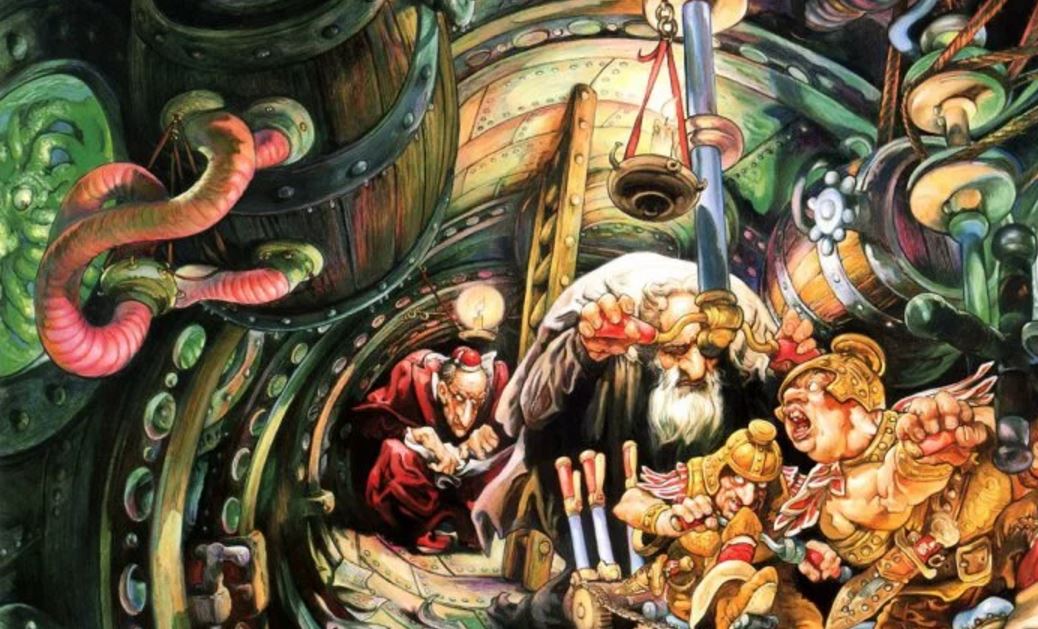Halfway down page two hundred and thirty one of ‘Jingo’, in the middle of a paragraph about Sam Vimes having an argument with his personal organiser, I reached a milestone in my Discworld re-read. I was halfway through the series and, now I have read the second half of ‘Jingo’, I have gone over the crest of the hill and only have to freewheel down the rest of the way.
In mind of this mini-celebration, I thought I would update the nerds amongst you on some statistics, if that is your sort of thing. It has taken me a little over nine months to get this far – the first article was published on the 15th September last year – and if I keep up this pace, I will publish my ‘The Shepherd’s Crown’ re-read in March 2017. Watch this space. So far, I have read 6405 pages. ‘Eric’ has been the shortest by a mile, clocking in at 155 pages, and ‘Jingo’ the longest, at 461. Looking back at how far I have come, I am feeling seriously energised for the second leg. Twenty books to go.
‘Jingo’ is a seriously topical novel, even more so in these last few days of referendum madness. The plot focuses on a territorial skirmish between Ankh-Morpork and Klatch. In the fear of an impending war between the nations, the citizens of Ankh-Morpork look upon their Klatchian neighbours, people who have lived with them for years, with suspicion and barely concealed racism. When you take into account that Klatchian is very much based upon an Arabic culture, this novel, published way back in 1997, suddenly feels very contemporary indeed. Add in questions of the right of citizens to bear arms and you begin to wonder if Sir Terry had a crystal ball tuned into June 2016. It certainly seems like it.
‘Jingo’ is a Watch novel and that is Ankh-Morpork’s saving grace, as usual. Sir Samuel Vimes does not go in for pointless and bloody wars, or the mistreatment of people based on anything except their genuine misdeeds. To twist a phrase from another tireless crusader, he is the hero that Ankh-Morpork does not deserve but desperately needs. Of course, Sam does not see himself that way; this novel contains the famous Discworld passage that many fans agree describes Vimes best. One of the council makes the mistake of calling him a military man and the response is thus; ‘Sometimes people attract attention by shouting. They might opt for thumping a table, or even take a swing at someone else. But Vimes achieved the effect by freezing, by simply doing nothing. The chill radiated off him. Lines in his face locked like a statue. “I am not a military man.”’ He has already proved this a hundred times over and he does it again by the end of ‘Jingo’, befriending a tribe in Klatch that has a particularly brutal reputation, and averting a war in the process.
A particularly fascinating addition to this story is that his personal organiser becomes confused halfway through the book, informing Vimes of appointments and engagements that another Vimes in another timeline should be attending. That timeline is not going well; in quick succession, he hears of the deaths of most of the key members of the Watch and then, inevitably, his own death. He is devastated by this, but realises that the timelines diverged in the moment he decided to come to Klatch, to try and solve the problems without bloodshed. The Samuel Vimes who stayed behind and did nothing had to watch his people die. If our Vimes ever needed validation that he makes the correct decisions, despite his own doubt, it is this. For us, it is a stark reminder that the biggest of futures can hinge on the smallest of decisions. I cannot decide if this reassures or worries me, after the events of the last few weeks and days.
This novel also features the largest role played by Leonard of Quirm, the Da Vinci of Discworld, who until now has mostly just been a name mentioned in passing. He is one of my very favourite characters, a brilliant inventor and artist, a man who is totally and endearingly innocent even whilst he builds siege weapons for the sheer engineering challenge of it, and who, as it happens, is kept in confinement by Lord Vetinari. Leonard doesn’t really mind this, as long as he has as much paper and charcoal as he wants, and I enjoy his relationship with Vetinari. The Patrician obviously has him locked up because of the threat that his intellect poses, but he also respects and admires him, and I loved their wonderfully vague conversations. Mad as Leonard is, I think Lord Vetinari recognises that he is probably the only person on the Disc who outstrips him intellectually. The fact that Vetinari likes only Leonard of Quirm and Samuel Vimes speaks magnitudes for his character, more than any other information we get about him.
Favourite Quote:
“In any case, you couldn’t’ really imprison someone like Leonard of Quirm. The most you could do was lock up his body. The gods alone knew where his mind went.”
Some of the coverage you find on Cultured Vultures contains affiliate links, which provide us with small commissions based on purchases made from visiting our site. We cover gaming news, movie reviews, wrestling and much more.



